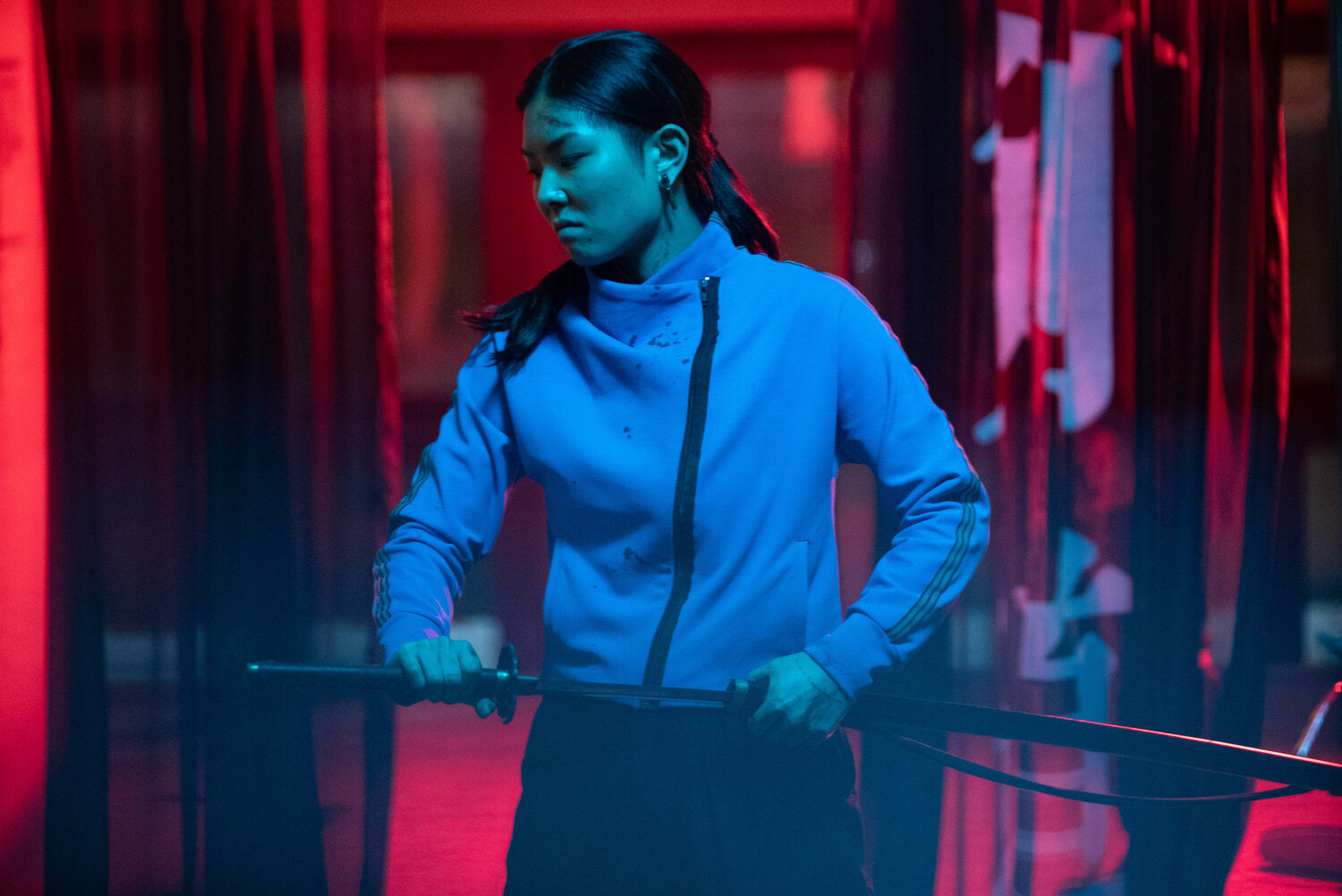What to Watch Verdict
An interesting plot twist sandwiched between some nicely lit shots is just not enough to hang a film on.
Pros
- +
💥 A mid-film plot twist is compelling, in theory.
- +
💥 What can I say? Neon lights are pretty.
Cons
- -
💥 Flat characters performed unenthusiastically.
- -
💥 Tedious pacing that destroys the momentum of a fairly cookie-cutter plot.
- -
💥 Poorly shot and edited action scenes.
Making movies is a difficult process, fraught by many moving pieces and unexpected disasters that need to be worked around, so it’s usually disingenuous to call filmmakers lazy from turning in a subpar piece of cinema. However, not all art is created equal, and Yakuza Princess is the epitome of filmmaking that, while not lazy, is noticeably sloppy. To demonstrate one small example, let’s take a look at a simple, entirely avoidable continuity error. The film’s prologue finds young Akemi amidst the chaos of a gangland hit that leaves her entire family dead. A title card prominently tells us that our story proper begins twenty years later, and Akemi’s (played by singer/songwriter MASUMI) age at the time of her family’s murder is established as six years old. Great, so she’s twenty-six, right? Nope. She’s celebrating her twenty-first birthday! This is a detail that stands out, not because it has any significant bearing on the plot, but because it’s such a glaringly obvious problem in the script that was not addressed at any point in the production, endemic of all the similarly careless choices that comprise this attempt at setting the stage for a continuing action franchise.
That detail also stands out because the film’s plot takes forever to get going, spending about half of its nearly two hours setting up its characters and setting by having those characters spout either exposition or inane drivel in service to a fairly basic premise. The Sao Paolo setting is an interesting divergence for a yakuza tale, taking the action to the largest Japanese community in the world outside of Japan, but the film could take place almost anywhere for how disinterested it is in interrogating that setting for anything more than its neon-drenched cityscape. Meanwhile, the plot is practically spelled out by the title: Akemi has become hunted by yakuza goons for reasons she doesn't completely understand, only to eventually discover (much later than the audience has obviously deduced) that she is an heiress to a yakuza clan who was thought to have been eliminated those twenty years ago, making her a threat to the modern gang’s hierarchy. Akemi’s life is only further complicated by the emergence of an amnesiac (Jonathan Rhys Meyers) carrying a famous katana that implies a connection with Akemi’s recently murdered grandfather.
To the film’s credit, Meyers’ role does form the basis for a fairly solid second-act twist, but the glacial pacing and completely wooden performances completely undercut any emotional impact that twist could have imparted. Whether because the film is bogged down by unnecessary scenes that establish inconsequential characters and handhold through obvious plot points, or because the actors are being so shoddily directed that their pulpy dialogue feels at home in a children’s stage production, Yakuza Princess drags for most of its runtime. MASUMI fares especially poorly, as she states her lines with all the conviction of reading cue cards held just off-screen, even though she does bring some fairly impressive physicality in the action scenes.
It’s too bad, then, that the fight choreography, when it bothers to rear its head at all, is so clumsily shot that the film can’t even skate by on its action beats. The camera has a nasty habit of cutting away from impacts just before they happen, a choice that is likely meant to hide how cheap some of the bloody effects work is, but it’s such a pervasive technique that it constantly feels like the film is hiding its appeal. The compensation for this seems to be to douse the screen in bright colors from the ambient street signs and to occasionally splash the camera lens with blood, but the effect is the visual equivalent of jangling keys in front of an infant. It may work for a little while, but it doesn’t take long to see the techniques as a blatant distraction from the action’s lack of crunchiness or finesse.
Yakuza Princess has obvious aspirations of starting a franchise, so much so that its climax feels appropriately half-baked for how it opts to adapt the serialized manga Samurai Shiro to cinematic structure. But if you’re going to make the first part of an epic, episodic tale with the hopes of making more, the first film has to be compelling enough in its own right to inspire repeat visitation to this story and characters. Even now, after having seen the film less than twenty-four hours prior to writing, I could not tell you one defining personality trait of Akemi or her amnesiac companion, nor any especially memorable action beat. The impression I have is of one conceptually interesting plot twist sandwiched between some shots lit with pretty colors. And that’s just not enough to hang a single film on, let alone a franchise.
Yakuza Princess arrives on VOD on September 3, 2021.
The latest updates, reviews and unmissable series to watch and more!
Leigh Monson has been a professional film critic and writer for six years, with bylines at Birth.Movies.Death., SlashFilm and Polygon. Attorney by day, cinephile by night and delicious snack by mid-afternoon, Leigh loves queer cinema and deconstructing genre tropes. If you like insights into recent films and love stupid puns, you can follow them on Twitter.


